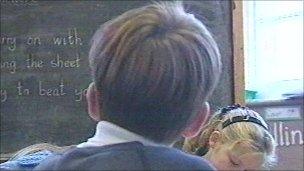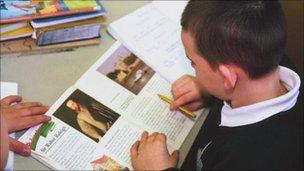New reading test for six-year-olds spelt out
- Published

Literacy levels among seven-year-olds are slightly up on last year
Ministers have given more details of plans to bring in reading tests for six-year-olds in England.
Teachers will run the tests, which will be based on phonics, where pupils learn the sounds of letters and groups of letters before putting them together.
Pupils in England will take the tests in Year 1 from 2012 and a pilot scheme will start next summer.
Ministers say the tests will be a "progress check" to help identify children needing extra support.
They want all children to learn to read using synthetic phonics and the government has set itself a target of promoting this method in schools.
Schools inspectors Ofsted also recently endorsed this method.
The Education Secretary Michael Gove says the test will confirm whether individual pupils have grasped the basics of "phonic decoding" by the end of Year 1.
At the moment, children are formally assessed by their teachers at the age of six or seven - with the results being reported to the government - so this reading test will come a year earlier.
Struggling
Mr Gove said a solid foundation in reading was crucial to a child's success in school and later life.
"In spite of the hard work of teachers and pupils, too many children are currently not reaching the expected reading levels at age seven and age 11," he said.

Critics say a regimented approach can turn children off reading
"We are determined to raise literacy standards in our schools, especially of those not achieving the expected level - a light-touch phonics-based check will provide reassurance that children in Year 1 have learned this important skill, will enable us to pinpoint those who are struggling at an early age and will give them the help they need before it is too late.
"It will be impossible to drill for and will be a true gauge of a child's reading skills.
"Parents want to know how their children are reading and this will tell them."
In Year 2, six and seven-year-old pupils in England are assessed by their teachers in English (reading and writing), maths and science.
They also take national tests, known as Sats, at age 10 or 11 in English and maths, the results of which are used to make up the primary school league tables.
The latest results of tests taken by six and seven-year-olds showed a slight rise in performance.
Just under 85% reached the expected level (Level 2) in reading, while almost 81% achieved this in writing.
Fewer boys make the grade: 80.9% did so in reading this year and 75.5% in writing.
Among children on free school meals nearly 72% reached Level 2 in reading and 64% did so in writing.
At age 11, one fifth of children fail to reach the level expected in English (Level 4) - although achievement in reading is better than in writing.
Teaching unions and head teachers have said phonics is a good way of teaching children to read but say it is not a magic formula and different children may require different approaches.
Most schools use the scheme already, but often alongside other methods. The government wants it to be used systematically - with children building up their phonic knowledge stage-by-stage.
Turned-off
A recent report by the United Kingdom Literacy Association warned against a "one-size-suits-all approach".
The group, made up of teachers, academics and librarians, says what works in the classroom "is a more comprehensive, integrated and flexible approach", where children can read texts that interest them - not just those based on developing ability in phonics.
The report says: "If we want England's children to get better at reading and to do more of it, we have to give them a diet that is attractive, nutritious and satisfying.
"Restricting them to an unbalanced diet, the thin gruel of a phonics-dominated approach, is a recipe for lowering standards and turning children against the written word."
- Published14 November 2010
- Published11 November 2010
- Published8 November 2010